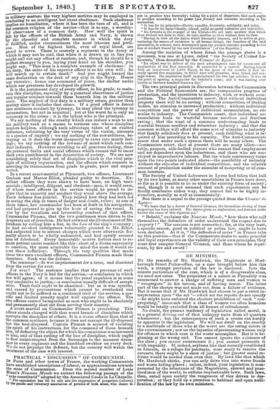PRACTICAL " DISCUSSION " OF COMMUNISM.
IN Paris and other towns of France, the working Communists have established associations of labour, as approximations towards the state of Communism. From the second number of Louis Blanc's Nouveau Monde we extract the following passage of the "acts constitutif" adopted by the Associated Cooks in La Chapelle. by " The association has for its sole aim the suppression of pauperism (misers) the pacific and voluntary association of persons of both sexes, who desire to put in practice true fraternity; taking for a point of departure, that each ought to produce according to his power (sea forces) and consume according to his necessities.
" It has for its principle—liberty, equality, fraternity, solidarity, and unity. " It has for its basis—family, labour, social property collective and indivisible. " Its formula is the evangel of the Christ—Do not unto another that which thou wishest not done to thee; do unto another as thou wishest done to thee.
"Having in view all the duties which humanity imposes, and to arrive at gua- ranteeing the means of existence to all human beings, the founders of the said association, in concert., have determined upon the present statutes according to the line of conduct traced by the new Constitution" Lof the Republic.]
Among the societies of whose forms the passage above is a specimen, was one at Lyons, called " the Society of United La- bourers," thus described by the Censeur de Lyon—
"Its object was to deliver at the most advantageous rate for consumers all productions of the first necessity. It succeeded to a marvel. Iiaviu begun with an investment of 1,000 francs, in the space of six months it had al- ready opened five magazines, in which were sold groceries, wine, bread, and sau- sage-wares; the association itself manufactured the two last articles; it was on the point of opening a magazine for butcher's meat; and it was turning over twelve or thirteen hundred francs a day."
The two principal points in discussion between the Communists and the Political Economists are, the comparative progress of production, and the incentives to industry, with or without com- petition. The Anti-Communists assert, that without individual property there will be no saving ; without competition of trading bodies, no stimulus to increased production ; without individual competition and the power of individual accumulation, no sti- mulus to industry. The Communists assert, that individual ac- cumulation leads to wasteful because needless and fruitless saving ; that the want of a common understanding leads to wasteful because needless and returnless industry ; and that the common welfare will afford the same sort of stimulus to industry that family solicitude does at present, each fulfilling what is re- quired of him according to his capacity. The Anti-Communists assert that under such pa system there will be many idlers. The Communists retort, that at present there are many idlers—no- tably, paupers, able-bodied persons who cannot find employment and are dependent upon the industrious, and those who are em- ployed in unproductive labours. But the whole controversy turns upon the two points indicated above—the possibility of industry without the stimulus of individual competition, and the relative amount of production under the stimulus of competing or of com- mon interests.
The Society of United Labourers in Lyons had taken that bull by its two horns, as many other associations in France have done, so far as it is possible to do so under the existing form of society ; and, though it is not assumed that such experiments can be finally conclusive either way, they cannot fail to be highly in- structive, morally as well as commercially.
But there is a sequel to the passage quoted from the Censeur de Lyon—
We learn that by a decree of General Gemeau, the immediate closing of these magazines has been ordered. The decree gives no explanation, and does not make known the cause of this rigorous act."
" Behold," exclaims the Nouveau Monde, "how those who call themselves the defenders of order understand the respect due to property! " The sarcasm is not unmerited ; for, at the very least, a specific reason, good in political or police law, ought to have been declared. As it is, " the defenders of order " in France take up this position—that if the Communists desire to make peaceful and legal experiments on the validity of their own principles, they must first conquer General Gemeau, and those whom he repre- sents, by fire and sword !


























 Previous page
Previous page